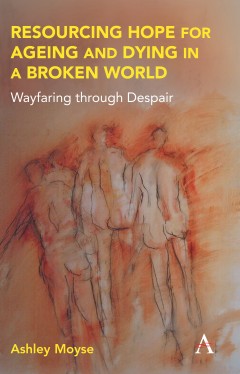Resourcing Hope for Ageing and Dying in a Broken World
Wayfaring through Despair
By Ashley Moyse
- About This Book
- Reviews
- Author Information
- Series
- Table of Contents
- Links
- Podcasts
About This Book
For those captive to the broken world of late modernity, wherein ageing and dying persons become vulnerable to despair, this book offers a diagnostic of such despair. It also resources the practices of a realistic, humanising hope that might enable a strength for person to journey with and for others, together, through such despair. Thus, by addressing the aetiology of despair experienced by people confronting ageing, frailty and dying, and drawing upon the writings of Gabriel Marcel, among others, Ashley Moyse reveals the problematic life of a broken world with its functionalising metaphors, instrumentalising reasoning and objectifying desires that offer no hope at all. It is a broken world where despair generates behaviours that anticipate suicide or other, often tragic, outcomes that impede or greatly curtail or even completely inhibit human flourishing. Resisting despair, but living through it, Moyse presents the activity of the moral life, demonstrating a way persons might be resourced through an intersubjective and reflective pedagogy, with its habits or practices that enable a humanising hope, liberating human beings to become those readied to confront the actualities of human living and dying, and encouraged to grow and develop as ‘wayfarers’, hopefully.
Reviews
Moyse powerfully argues why medicine must expand its focus beyond maintaining a patient’s autonomy. He convincingly argues that we must develop our ability to be present and attend to the needs of others. [...] Chaplains, ethicists, and others will find much to ponder. —Religious Studies Review
Author Information
Ashley Moyse is Assistant Professor of Medical Ethics and McDonald Scholar in the Columbia Center for Clinical Medical Ethics at Columbia University Vagelos College of Physicians & Surgeons.
Series
Anthem Religion and Society Series
Table of Contents
Acknowledgements; Introduction. Diagnosing Despair. Resourcing Hope; Chapter 1. Pain, Suffering and the Broken World; Chapter 2. Ageing ‘As One More Opportunity to Fail’; Chapter 3. Dying Deceived by Despair in Disguise; Chapter 4. Wayfaring through Despair, Practicing Hope; Afterword by Lydia S. Dugdale; Bibliography; Index.
Links
Stay Updated
Information
Latest Tweets



